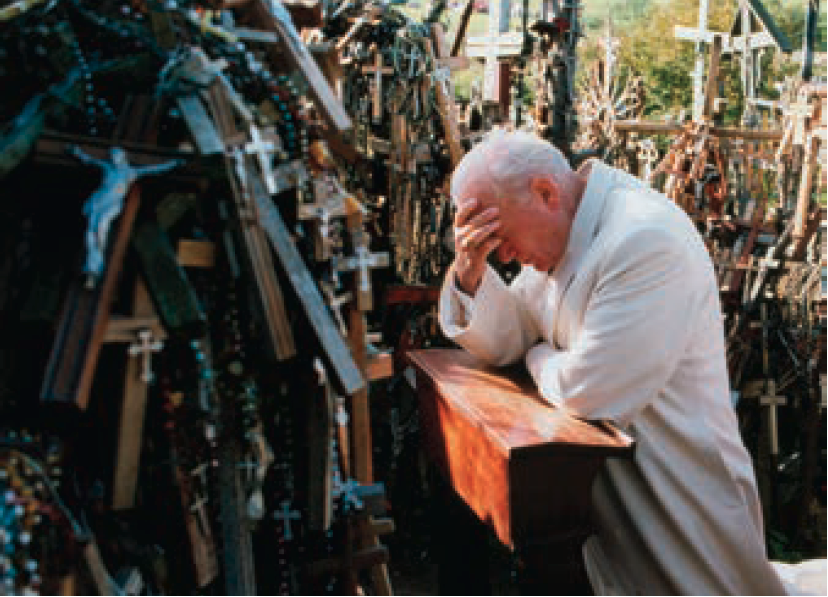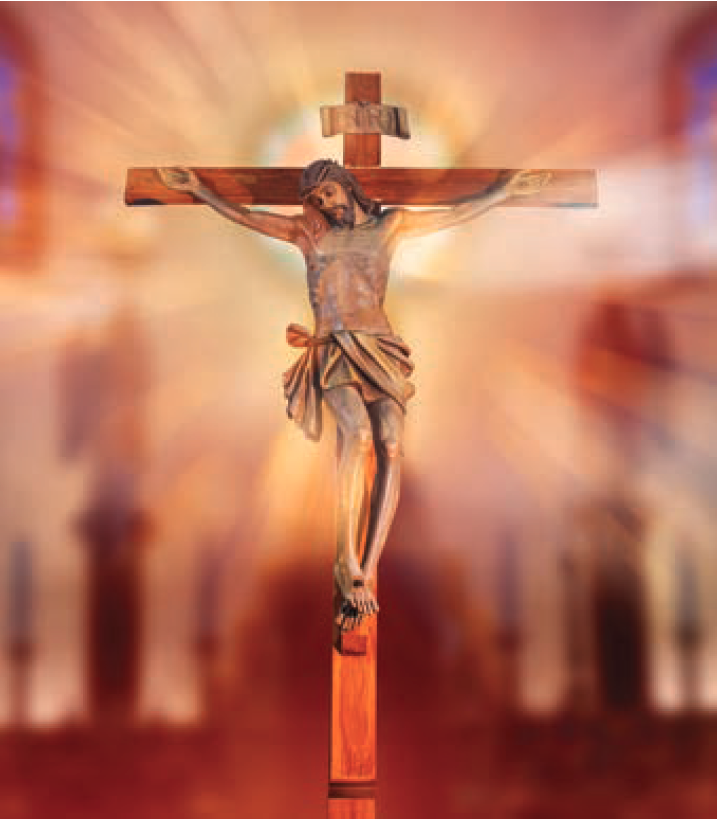Facing Discord, Old and New in the Church
Strategies for dealing with conflict
Father Ronald D. Witherup Comments Off on Facing Discord, Old and New in the Church
Some pundits claim that we live in the most divisive times in human history. While this may or may not be accurate, there is no denying the multiple divisions and conflicts that persist today. Sadly, examples abound in virtually every aspect of modern life: race relations, gender identity, ethnic tensions, generational divides, international conflicts, political divisions and, of course, religious divisions, seen not only in ecumenical and interfaith tensions but also within the Catholic Church herself. Battles are still being waged over liturgy and the interpretation of the Second Vatican Council. A recent study by The Catholic University of America also highlighted divisions between presbyters and their bishops. The former do not entirely trust the latter, especially in light of the fallout from the sexual abuse crisis.
What are presbyters called to do in such a context? How can we preach the Gospel Sunday after Sunday knowing that our communities — and perhaps we ourselves — are caught up in a world of divisions?
Gaining Perspective
Before we try to address this contemporary issue, a glance back in history might provide some perspective. In New Testament times, the world was, in fact, quite divided. There was a tendency to identify opposing groups. Thus you were either Roman or pagan, Greek or barbarian, Jew or gentile, free person or slave, rich or poor, and so on.
Maybe this is a human anthropological tendency, but the New Testament indicates that it is far from ideal. The Acts of the Apostles portrays the ideal community, living in harmony (cf. 2:42-47), but we don’t need to scratch the surface much to see that this idyllic portrait was not always a lived reality (cf. 5:1-11 for the story of Ananias and Sapphira).
Perhaps even more troubling are Jesus’ own words as recorded in Luke’s Gospel: “I have come to set the earth on fire, and how I wish it were already blazing! Do you think that I have come to establish peace on the earth? No, I tell you, but rather division” (12:49, 51).
Whatever happened to Jesus as meek and mild? Of course, these words must be placed in their proper context in Luke and his portrayal of Jesus as a prophet. These are not words of purpose or intent, but of results. Jesus is not desiring division but prophetically proclaims that this is what will come of his Gospel message. It will sadly cause division, even within the community of disciples and their families. And this is exactly what transpired.
The Corinthian Situation
Probably the classic example of divisions in the New Testament comes from Paul’s First Letter to the Corinthians. He wrote to this beloved but wayward community on the basis of both oral and written reports he had received about their bad behavior. Paul lays out his approach starkly in the very first chapter. He recalls a report he received that says there are “rivalries” (translated “quarrels” in the NRSV) in the community.
“I mean that each of you is saying, ‘I belong to Paul,’ or ‘I belong to Apollos,’ or ‘I belong to Cephas,’ or ‘I belong to Christ.’ Is Christ divided?” (1 Cor 1: 12-13).
……………………………………………………………………………………………………………………………………………………
Wounded World
Our world is being torn apart by wars and violence, and wounded by a widespread individualism which divides human beings, setting them against one another as they pursue their own well-being. In various countries, conflicts and old divisions from the past are re-emerging. I especially ask Christians in communities throughout the world to offer a radiant and attractive witness of fraternal communion. … It always pains me greatly to discover how some Christian communities, and even consecrated persons, can tolerate different forms of enmity, division, calumny, defamation, vendetta, jealousy and the desire to impose certain ideas at all costs, even to persecutions which appear as veritable witch hunts. Whom are we going to evangelize if this is the way we act?
— Pope Francis, Evangelii Gaudium, Nos. 99-100
………………………………………………………………………………………………………………………………………………….
The issue was that the community was being divided by exclusive allegiances based on who had baptized them. It was as if they promoted fan clubs. (Presbyters are not immune to these, either!) And Paul lambastes them for it because it harms the “body of Christ,” his favorite expression for the Church as the communion of “the holy ones.”
Later in the letter, Paul recalls these divisions as impacting even the way the Corinthians celebrated “the Lord’s supper” (1 Cor 11:20), which at that time took place in “house churches” where the community would gather. Paul once more chastises them because the richer members of the community were getting ahead of the celebration of the agapeic meal while the poorer members were left to fend for themselves. Paul then harks back to the Last Supper tradition (cf. 11:23-26) to bring them to their senses. He recommends that they examine their own consciences to assess how well they are adhering to the ideal (cf. vv. 28-29). He ends by warning them they will be judged by the Lord and held accountable for how well they built up the Body of Christ rather than tearing it apart.
Confronting Divisions
What can we presbyters do in light of the conflicts and divisions we witness in our Church and our world? Let me suggest one somewhat passive approach and several active strategies.
As a kind of passive way to help limit the negative effects of conflict, I suggest presbyters resolve to abstain from participation in the “culture wars” that are a part of our modern context. In particular, careful and limited use of social media is necessary. I am quite astounded to see that numerous clerics, some of whom hide behind true identities, and others who proudly tout their clerical ID, engage in name-calling, heckling and outright support of political partisanship.

Canon law specifically prohibits the latter except in rare circumstances with ecclesiastical approval (cf. Code of Canon Law, No. 287.2), as do the rules of tax exemption in the United States. Yet some clerics nonetheless engage in overtly political activities. Excusing this behavior by invoking particular doctrinal positions does not justify intensifying conflicts and divisions that are already deep-seated.
Benjamin Franklin reputedly offered a piece of sound advice in this regard: “Remember not only to say the right thing in the right place, but far more difficult still, to leave unsaid the wrong thing at the tempting moment.” In other words, at times, we may have to tamp down our desire to fling angry words that may only fuel the flames of conflict further. This is at least a passive response, but what proactively can we do?
Proactive Strategies
I propose four simple and seemingly common-sense steps.
Recovering Humility as a Virtue
The first is the desperate need to recover humility as a virtue. In a world where getting ahead, bullying and never admitting defeat or fault are rampant, humility, in any real sense of the word, is absent. Some people were upset when Pope St. John Paul II, in the buildup to the third Christian millennium, expressed a number of “apologies” on behalf of the Catholic Church for serious errors made by leaders over the centuries. The list is long and included apologies for treatment of Jews and Muslims, women and victims of sexual abuse, various Protestant figures like Jan Hus and Martin Luther, victims of the African slave trade and Indigenous peoples. While some may consider these acknowledgments too little, too late, their goal is surely to help the Church rediscover her humility.
Vatican II, whose 60th anniversary is taking place, attempted to redirect the Church’s self-image through such ecclesial notions as “the People of God” and a “pilgrim Church.” Such biblically based images are a way of admitting that the Church is a servant and not the “Lord and Master.” Both Pope Benedict XVI and Pope Francis, in their own way, picked up on their predecessor’s path by promoting a humbler vision of the Church. Pope Francis has repeatedly called for a less triumphalist vision of the Church. His sincere apology to the First Nation peoples of Canada in 2021 was a dramatic example of such humility. Francis also invokes the image of the Virgin Mary to call the Church to humility.
………………………………………………………………………………………………………………………………………………..
Scandal of Division in Christianity
Given the seriousness of the counter-witness of division among Christians, particularly in Asia and Africa, the search for paths to unity becomes all the more urgent. Missionaries on those continents often mention the criticisms, complaints and ridicule to which the scandal of divided Christians gives rise. If we concentrate on the convictions we share, and if we keep in mind the principle of the hierarchy of truths, we will be able to progress decidedly towards common expressions of proclamation, service and witness. The immense numbers of people who have not received the Gospel of Jesus Christ cannot leave us indifferent. Consequently, commitment to a unity which helps them to accept Jesus Christ can no longer be a matter of mere diplomacy or forced compliance, but rather an indispensable path to evangelization. Signs of division between Christians in countries ravaged by violence add further causes of conflict on the part of those who should instead be a leaven of peace. How many important things unite us! If we really believe in the abundantly free working of the Holy Spirit, we can learn so much from one another! It is not just about being better informed about others, but rather about reaping what the Spirit has sown in them, which is also meant to be a gift for us. To give but one example, in the dialogue with our Orthodox brothers and sisters, we Catholics have the opportunity to learn more about the meaning of episcopal collegiality and their experience of synodality. Through an exchange of gifts, the Spirit can lead us ever more fully into truth and goodness.
— Pope Francis, Evangelii Gaudium, No. 246
……………………………………………………………………………………………………………………………………………….
“There is a Marian ‘style’ to the Church’s work of evangelization,” he teaches in Evangelii Gaudium. “Whenever we look to Mary, we come to believe once again in the revolutionary nature of love and tenderness. In her, we see that humility and tenderness are not virtues of the weak but of the strong who need not treat others poorly in order to feel important themselves” (No. 288).
Embracing the Cross
A second strategy is for presbyters to reflect in greater depth on the meaning of the Cross. This is a strong aspect of St. Paul’s theology, but one which can recede into the background because it is less appealing in a modern world that promotes individualism, dominance and strength.
Paul boldly proclaimed to the Galatians, “But may I never boast except in the cross of our Lord Jesus Christ, through which the world has been crucified to me, and I to the world” (6:14).

Once more, Pope Francis leads the way. He explains the power of the cross: “Christian triumph is always a cross, yet a cross that is at the same time a victorious banner borne with aggressive tenderness against the assaults of evil. The evil spirit of defeatism is brother to the temptation to separate, before its time, the wheat from the weeds; it is the fruit of an anxious and self-centered lack of trust” (Evangelii Gaudium, No. 85).
Recovering the profound meaning of the Cross can help us overcome divisions.
Promoting Sacramental Identity
My third strategy concerns a rediscovery of the power of our sacramental identity as a Church. In particular, I suggest presbyters focus on the two sacraments designed to bridge chasms between people and to promote unity: baptism and Eucharist.
For baptism, we should recall that being baptized into Christ (Paul’s language) is to die with Christ in order to rise with him (cf. Rom 6:3-4). Baptism bestows a new identity on all. We are called into a new community, the assembly of the faithful, where all have equal dignity. Baptism draws us into a new familial relationship — the family of disciples — where unity should be the hallmark. In a most prominent statement on baptismal identity, Paul proclaims that whoever is “in Christ” is dramatically transformed. “There is neither Jew nor Greek, there is neither slave nor free person, there is not male and female; for you are all one in Christ Jesus” (Gal 3:28).
What would the world look like if we took this passage to heart? Even Jesus warned would-be disciples that they would have to leave other relationships aside (even family!) in order to become faithful members of the new community of disciples (cf. Mt 10:37-38). That is why he taught them to pray the Our Father (cf. Mt 6:9). Belonging to this new community of faith unites us under one heavenly Father and calls us to live with one another in a spirit of forgiveness and reconciliation. In such a community of faith, ethnic, religious, political, national identities and other aspects are quite secondary. Renewing our baptismal promises, especially in the Easter season, should be an occasion to recall this sacramental transformation. I believe it would help us recover some of what we have lost in allowing human divisions to creep into our faith life and cause it to fracture.

If any sacrament was meant to promote unity, it is surely the Eucharist. This offers us another opportunity to reclaim our sacramental identity if we are willing. The U.S. bishops recently approved a plan for Eucharistic renewal that will climax in a holy year (2025) and a Eucharistic Congress in July 2024 and “a year of going out on mission” (July 21, 2024, to Pentecost 2025). The impetus for this endeavor came after a sociological survey showed, astonishingly, that only about a third of U.S. Catholics believe in the real presence of the Risen Christ at Mass.
While the response to this situation seems to emphasize the recovery of Eucharistic devotions, I suggest a more important step. As helpful as such devotions are (think Exposition and Benediction of the Blessed Sacrament, Corpus Christi processions, Eucharistic congresses, pilgrimages, etc.), even more critical is the need to renew the way we celebrate the Eucharist.
In my experience, as presbyters get older, we become rather staid in the way we preside at Mass. It becomes a mere routine. We can go through the motions without thinking about what we are doing. Moreover, the reality of many large, urban parishes sometimes means promoting a common sense of community and fraternity can be difficult to achieve. Yet, we must remember that most of our parishioners’ main contact with the Faith is at Sunday Mass. It is a critical “teaching moment” if well planned and executed.
What if, as part of our Eucharistic renewal, we presbyters could refresh our regular parish celebrations? Not just for ourselves, but also for the other ministers who assist at liturgy — deacons, musicians, lectors, ushers (who are often important greeters), altar servers and so on? Could we perhaps organize some renewal sessions for all involved in liturgy and work at making the Eucharist come alive for our congregations?
Years ago, with the local bishop’s and pastor’s permissions, I initiated in my parish the practice of taking one Sunday a year to explain several important aspects of the Mass. On that Sunday, instead of a usual homily, I explained succinctly each part of the Eucharist and their importance by using short quotations from the documents of the Vatican and offering short, pointed explanations of the gestures and words we use so routinely. The response was overwhelmingly positive. Parishioners expressed being amazed at the beauty of our Eucharistic traditions, and they expressed great appreciation for being able to understand better something they had either forgotten or never knew.
I remember vividly the response once after I had read and explained the passage from the Constitution on the Sacred Liturgy in which the multiple ways the Risen Christ is present at liturgy is proclaimed:
“Christ is always present in his Church, especially in her liturgical celebrations. He is present in the sacrifice of the Mass, not only in the person of his minister … but especially under the Eucharistic species. By his power he is present in the sacraments, so that when a man baptizes it is really Christ himself who baptizes. He is present in his word, since it is he himself who speaks when the holy Scriptures are read in the Church. He is present, lastly, when the Church prays and sings” (Sacrosanctum Concilium, No. 7).
This was an eye-opener, not only for the parishioners, but also for the lectors who suddenly realized the importance of their ministry of proclaiming the Word of God with fervor. They, too, are a vehicle who communicates the real presence of Christ in the Eucharist.
In short, if we can recapture some of our sacramental identity that is a vital part of the Church’s faith, it could help significantly to overcome divisions that tend to creep in over time.
Embracing the Synodal Moment
My final suggestion concerns the recent decision by Pope Francis to lead the Church along the synodal path that is part of our ancient heritage. Granted, that “process,” of any kind, tends to be messier, more cumbersome and takes a lot of time and energy. Nevertheless, promoting a synodal methodology can contribute greatly to overcoming divisions because everyone then can have a voice. This is not a democratic, majority-rule system, but rather a process of discernment that allows every voice in the Church to speak under the guidance of the Holy Spirit. I have written elsewhere in The Priest about the synod and will not repeat that information here. Rather, what I will emphasize is the need to let people speak and to listen with a discerning heart. Only when we presbyters — young and old, experienced and newly ordained, those from “both sides of the aisle” — can speak to one another and try to move to a unified vision will we be effective in leading our flocks along a similar path.
SULPICIAN FATHER RONALD WITHERUP is former superior general of the Society of Saint Sulpice. He has authored many books, including “Scripture and Tradition in the Letters of Paul” (Paulist Press, 2021).
………………………………………………………………………………………………………………………………………………..
Communal Life
They devoted themselves to the teaching of the apostles and to the communal life, to the breaking of the bread and to the prayers. Awe came upon everyone, and many wonders and signs were done through the apostles. All who believed were together and had all things in common; they would sell their property and possessions and divide them among all according to each one’s need. Every day they devoted themselves to meeting together in the temple area and to breaking bread in their homes. They ate their meals with exultation and sincerity of heart, praising God and enjoying favor with all the people. And every day the Lord added to their number those who were being saved.
— Acts 2: 42-47
………………………………………………………………………………………………………………………………………………..





